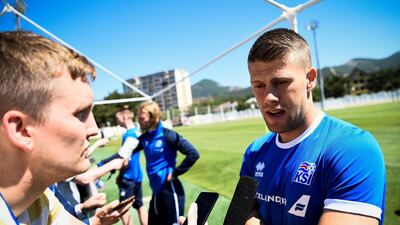When Johann Berg Gudmundsson was growing up, he never thought he would play in a World Cup. It is not a case of false modesty.
Growing up Icelandic conditioned his expectations. No country Iceland’s size had ever qualified.
Gudmundsson’s formative World Cup memories instead revolved around David Beckham’s red card against Argentina in 1998 and Ronaldinho’s remarkable winner to embarrass David Seaman in 2002.
He supported England at major tournaments. Two years ago, he helped eliminate them from one. He was part of the Iceland side who reached the quarter-finals of Euro 2016.
Now a man whose international debut came in a draw with Azerbaijan is set to face Argentina in Iceland’s maiden World Cup game on Saturday.
“It’s a dream come true, especially when you’re from a nation that has 330,000 living there,” said the Burnley winger.
More than 10 per cent of Iceland’s population travelled to France to cheer them on in Euro 2016. It gives them a connection with their fans more sizeable nations lack.
___________
Read more
World Cup 2018 live blog Day 2: Egypt and Mohamed Salah's big day and Spain v Portugal
World Cup 2018: Blogs, guides, predictions, podcasts, galleries and where to watch in UAE
___________
Gudmundsson explained: “Iceland is such a small country, a lot of players in the team will know a lot of people in the stands.”
They will recognise faces and sounds alike. The Iceland supporters’ trademark thunderclap became the soundtrack to Euro 2016.
“It gives you goosebumps when you hear it,” Gudmundsson said. “It’s something different, something nice to be considered ours.”
Circumstances have forced Iceland to be defiantly different. Manager Heimir Hallgrimsson is also a dentist.
“When he has a bit of downtime, he might fix some people’s teeth,” Gudmundsson said, as though it is entirely normal.
Hallgrimsson has more immediate priorities. Gudmundsson, aware that this may be a one-off opportunity for his country, wanted a glamour tie with either Brazil or Argentina. He got his wish in a scenario that provides parallels with the past.
“The first game in the Euros, we played [Cristiano] Ronaldo, this time it’s going to be [Lionel] Messi,” Gudmundsson said.
“We kept Ronaldo quite quiet so hopefully we can do the same against Messi.” The gameplan, he guessed, would be to “probably have a few players run after him the whole game, just mark this guy”.
Iceland drew with Portugal two years ago, a result that was overshadowed when they beat England. “It definitely gives us a massive confidence boost,” he added.
Opponents are warned, but Iceland retain a status as outsiders. “I still think we are a surprise package,” Gudmundsson reasoned. “I mean, we are still Iceland, it’s only our second tournament so obviously we’re going to be the underdogs.”
The aims are the same. “We want to get out of the group stage and after that is a bonus,” he said.
The context may be harder. They are without the injured striker Kolbeinn Sigporsson. Captain Aron Gunnarsson has been sidelined by a knee problem. Gylfi Sigurdsson has returned to action in friendlies but has not played competitive football for three months.
“He’s obviously a great footballer but he does his defensive work and when other players see the biggest star running around and doing the ugly stuff, you think to yourself we all got to do it as well,” Gudmundsson said, outlining Iceland’s collective commitment.
They have overcome great challenges to get this far and faced tougher hardships than injuries. Gudmundsson thought back to his youth, to the time when he supported England because the idea of Iceland at a World Cup was just too improbable.
“We played on gravel pitches and on bad artificial pitches,” he said. “I was probably about 13 when the indoor hall came.
"My club was the first one to get it so I was quite lucky in that I could play inside all year. Before that it was tough in the snow as well, but you didn’t let anything stop you. You just went out and played.” And now he will just go out and play against Argentina in a World Cup.


